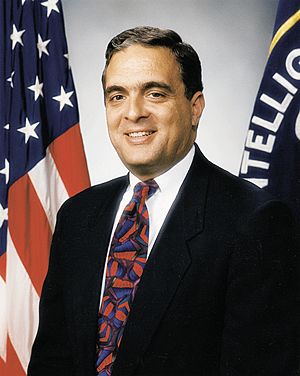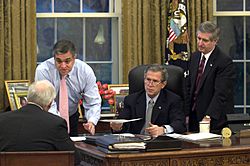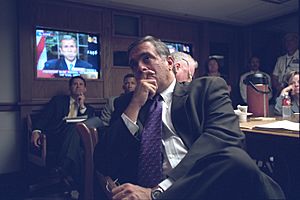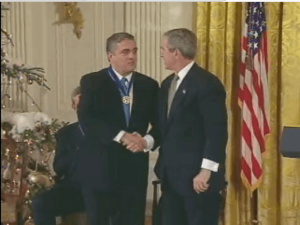George Tenet facts for kids
Quick facts for kids
George Tenet
|
|
|---|---|
 |
|
| 18th Director of Central Intelligence | |
| In office December 16, 1996 – July 11, 2004 Acting: December 16, 1996 – July 11, 1997 |
|
| President | Bill Clinton George W. Bush |
| Deputy | John A. Gordon John E. McLaughlin |
| Preceded by | John M. Deutch |
| Succeeded by | Porter Goss |
| 19th Deputy Director of Central Intelligence | |
| In office July 3, 1995 – July 11, 1997 |
|
| President | Bill Clinton |
| Preceded by | William O. Studeman |
| Succeeded by | John A. Gordon |
| Personal details | |
| Born |
George John Tenet
January 5, 1953 New York City, New York, U.S. |
| Spouse | Stephanie Glakas |
| Education | Georgetown University (BS) Columbia University (MIA) |
| Signature | |
George John Tenet, born on January 5, 1953, is an American intelligence expert. He served as the head of the Central Intelligence Agency (CIA) for the United States. He was also a special professor at Georgetown University.
Tenet was the Director of Central Intelligence (DCI) from July 1997 to July 2004. This made him the second-longest-serving director in the CIA's history. He was also one of the few DCIs to work for two different U.S. presidents. He played a big part in looking into information about weapons of mass destruction before the Iraq War. A report in 2005 said Tenet was responsible for the U.S. intelligence community not having a plan to control al-Qaeda before the 9/11 attacks. He was also criticized for allowing the CIA to use tough questioning methods. He has always said these claims are not true.
In February 2008, he started working as a managing director at an investment bank called Allen & Company.
Contents
Early Life and Education
George John Tenet was born in Flushing, Queens, New York, on January 5, 1953. His parents, Evangelia and John Tenet, were immigrants from Greece. His father came from Albania and worked in a coal mine in France. He arrived in the United States before the Great Depression. His mother was from Greece and escaped from communists by hiding on a Royal Navy submarine.
Tenet grew up in Little Neck, Queens. As a teenager, he and his older brother Bill worked as busboys in their family's diner. Even though they were twins, they had different personalities. George was known for talking a lot, earning him the nickname "the mouthpiece." He was also very interested in the news. He played basketball and softball for his church.
Tenet went to Public School 94 and Junior High School 67. He graduated from Benjamin N. Cardozo High School in 1971. He played soccer and edited the school newspaper there. After attending the State University of New York at Cortland, Tenet earned a degree from Georgetown University in 1976. He then received a master's degree from Columbia University in 1978.
Starting His Career
After college, Tenet's first job was as a research director for the American Hellenic Institute from 1978 to 1979. Then, he worked for the Solar Energy Industries Association until 1982. He then started working for the Senate. He was a legislative assistant and later legislative director for Senator H. John Heinz III from 1982 to 1985.
From 1985 to 1993, he worked for the Senate Select Committee on Intelligence (SSCI). He became the Staff Director of the SSCI in 1988. In 1992, he joined President-elect Bill Clinton's team. Clinton then made Tenet a Senior Director at the National Security Council from 1993 to 1995.
Tenet was involved in a legal case about wiretapping. The CIA used a special rule to try and stop the case. It was later reopened and settled. During the case, a judge said that some people, including Tenet, had issues with honesty.
Working at the CIA
Tenet became the Deputy Director of Central Intelligence in July 1995. After John Deutch left in December 1996, Tenet became the acting director. He was officially appointed Director on July 11, 1997, after the Senate voted for him.
Unlike many past directors, Tenet stayed in his role through the end of the Clinton administration and into the term of George W. Bush. In 1999, Tenet decided not to share the total budget for intelligence operations. This was different from what he had done in the previous two years. Some people who wanted more government openness criticized this decision.
Tenet worked to make the CIA stronger again. The number of new agents had dropped a lot after the Cold War. Tenet reminded everyone of the CIA's main goal: to "prevent another Pearl Harbor." He focused on new dangers like changes in Russia and China, "rogue states" like North Korea, Iran, and Iraq, and terrorism.
1999 Bombing of the Chinese Embassy
On May 7, 1999, during the Kosovo War, U.S. bombers accidentally hit the Chinese embassy in Belgrade, Serbia. Three Chinese reporters died, and 20 others were hurt. Tenet later said the CIA organized this strike, but it was not on purpose. Later studies showed a mistake in a military targeting database. This led to new rules for U.S. pilots to check target information carefully. China has never fully accepted the U.S. explanation.
Peace Efforts in the Middle East
In 2001, Tenet helped arrange a short-term ceasefire between Israelis and Palestinians.
Against Releasing Jonathan Pollard
Tenet strongly opposed releasing Jonathan Pollard, who was a convicted spy. He even said he would resign if President Clinton pardoned him.
Al-Qaeda and the War on Terror
By 1999, al-Qaeda was a big terrorist threat. They had attacked U.S. embassies in Africa in 1998. In 2000, the USS Cole was attacked in Aden, killing 17 sailors.
Bin Laden Plan
In 1999, Tenet created a plan to deal with al-Qaeda. He put new leaders in charge of the CIA's Counterterrorist Center (CTC). He chose Cofer Black to lead the CTC and Richard Blee to lead the unit focused on Bin Laden. The plan aimed to send U.S. and Afghan agents into al-Qaeda's areas in Afghanistan. This would help gather information and plan actions against Bin Laden.
The CIA put its money into this plan. Intelligence gathering on bin Laden and al-Qaeda increased a lot from 1999. Tenet said that by 9/11, the CIA had many ways to collect information across Afghanistan. However, Bin Laden's closest group was not fully covered.
A 2005 report said Tenet did not do enough. But Tenet had told National Security Advisor Condoleezza Rice about the danger on July 10, 2001. His team warned her that "There will be significant terrorist attacks against the United States in the coming weeks or months."
Predator Drone Use
The CIA tried using a small remote-controlled aircraft called the Predator. They hoped to spot Bin Laden in Afghanistan. Flights in late 2000 showed possible sightings of the al-Qaeda leader.
Some officials wanted to arm the Predator with missiles to try and kill Bin Laden. But there were legal and technical problems. Tenet was worried about the CIA getting back into targeted killings. Tests in Nevada in 2001 had mixed results.
Tenet gave careful advice about this at a meeting on September 4, 2001. He said if the government wanted the CIA to use armed drones, they should know the risks. It was decided that the armed Predator was needed but not ready. Tenet then ordered the CIA to continue reconnaissance flights. The CIA was allowed to use "weapons-capable aircraft."
September 11 Attacks
After the September 11 attacks, many people criticized the Intelligence Community. They said that failures in intelligence were a main reason the attacks were not stopped.
Tenet spoke at a public hearing for the 9/11 Commission. He first said he did not meet with President Bush in August 2001. This was the month before the attacks. Later, a CIA spokesperson corrected his statement. Tenet had met with Bush twice in August. In his book, Tenet wrote about visiting Bush at his ranch in Texas in August 2001.
In August 2007, a report from the CIA's inspector general was made public. It was written in 2005 but kept secret. The report said Tenet knew about the dangers of al-Qaeda before September 2001. However, it said the CIA leadership did not do enough to stop attacks. It stated Tenet "bears ultimate responsibility" for the intelligence community's failure to plan against al-Qaeda. Tenet said the report was "flat wrong," pointing to his planning efforts.
Tenet quickly increased the size of the CIA's special operations group. These officers were the first to enter Afghanistan and Iraq. They helped organize local forces against the Taliban in Afghanistan and against Saddam's forces in Iraq. Building up this group and their successful missions is seen as one of Tenet's biggest achievements.
Worldwide Attack Matrix
Tenet believed his al-Qaeda plan put the CIA in a better position after the September 11 attacks. He said:
How could [an intelligence] community without a strategic plan tell the president of the United States just four days after 9/11 how to attack the Afghan sanctuary and operate against al-Qa'ida in ninety-two countries around the world?

This was at a meeting at Camp David on September 15, 2001. Tenet showed the Worldwide Attack Matrix. This was a plan for what became known as the War on Terror. He suggested sending CIA teams into Afghanistan. These teams would gather information and carry out secret missions against al-Qaeda and the Taliban. President Bush later praised this plan.
Controversial Interrogation Methods
During Tenet's time as director, President Bush allowed the CIA to use certain tough questioning methods. These were used during interrogations of suspected Al-Qaeda members like Khalid Sheikh Mohammed. CIA directors, including George Tenet, gave information about these programs. Some reports later said this information was not always accurate.
Iraq WMD Controversy
According to a book by journalist Bob Woodward, Tenet supported intelligence reports about weapons of mass destruction (WMDs) in Iraq. In December 2002, he told Bush that the evidence for WMDs was a "slam dunk case." After the 2003 invasion of Iraq, no major WMDs were found. Tenet later said his "slam dunk" comment was taken out of context. He said it was about how to convince Americans to support invading Iraq.
In September 2002, the Senate Intelligence Committee met with Tenet. Senator Bob Graham asked for a special intelligence report on Iraq. Tenet said they had never done one and did not want to. Graham insisted, saying it was a very important decision for Congress and the American people. Tenet agreed to do a report on WMDs. Graham later said this meeting changed his view of Tenet. He felt the intelligence community was too willing to agree with the administration.
Congress voted to support the Iraq war based on the report Tenet provided in October 2002. However, a Senate report in 2004 found that the main findings in Tenet's report were either exaggerated or not supported by the actual intelligence. The Senate report also said the U.S. Intelligence Community had problems with its culture and management.
Resignation from the CIA
Tenet told President Bush he was resigning on June 3, 2004. He said it was for "personal reasons" and for his family's well-being. He officially left on July 11, exactly seven years after he was appointed. Bush said he was sorry Tenet was leaving and that he had done a "superb job."
James Pavitt, a high-ranking CIA official, also resigned the next day. This led to talk that their resignations were linked to the controversies over the September 11 attacks and the Iraq war. After Tenet left, John E. McLaughlin became acting director until Porter Goss took over. Tenet's seven years as Director of Central Intelligence was the second-longest in U.S. history.
Life After the CIA
On December 14, 2004, President George W. Bush gave Tenet the Presidential Medal of Freedom. Bush said Tenet "was one of the first to recognize and address the growing threat to America from radical terrorist networks." Some critics, however, did not agree with this award.
Tenet spent three years as a special professor at his old university, Georgetown. He started teaching in the fall of 2005.
In October 2006, Tenet joined a British defense company called Qinetiq. He left that board in October 2007. He also became a managing director at the investment bank Allen & Company. Tenet is also on the boards of other companies, including one that makes biometric identification software. He is also part of a group that helps teach students about public affairs.
His Book
In April 2007, Tenet released his book called At the Center of the Storm: My Years at the CIA. He appeared on 60 Minutes to talk about it. The book was a top seller in its first week.
In his book, Tenet talked about claims that Abu Zubaydah, an al-Qaeda member, was mentally unstable. Tenet said this was "Baloney." He wrote that Abu Zubaydah had important information and shared it. He explained that Abu Zubaydah's diary, which made some think he had multiple personalities, was actually a clever way of writing.
Critics found a mistake in Tenet's book. He wrote about a conversation with Richard Perle on September 12, 2001. Tenet claimed Perle told him that "Iraq had to pay for the attack." But Perle was in Paris that day and did not return to Washington until three days later. Perle later said they did see each other that week, but they did not talk.
Personal Life
Tenet is married to A. Stephanie Glakas-Tenet. They have one son, John Michael.
Awards and Recognition
In 1998, Tenet received the Golden Plate Award from the American Academy of Achievement. In 2018, Tenet received the Washington Institute's Scholar-Statesman Award.
See also
 In Spanish: George Tenet para niños
In Spanish: George Tenet para niños
- Bin Laden Issue Station: The CIA's unit that tracked Osama bin Laden from 1996 to 2003.
 | Leon Lynch |
 | Milton P. Webster |
 | Ferdinand Smith |



